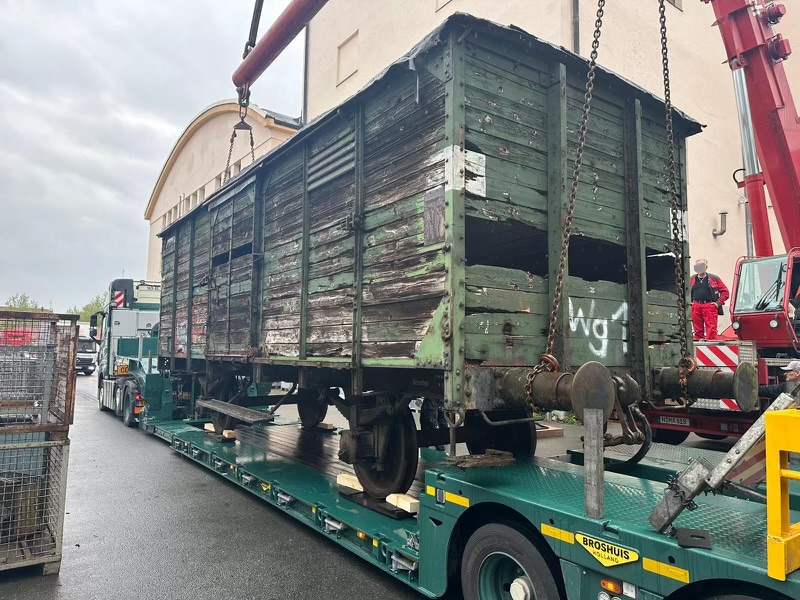Unveiling History: How the Preservation of a WWII-era Deutsche Reichsbahn Rail Car Helps People Understand the Holocaust
Visitors to the American Heritage Museum may notice a project taking place in the restoration area behind the museum over the coming year. Though this project is significantly different than the heavy tanks and mechanized vehicles that are normally found here, the historical weight of this artifact is immense and once complete, it will become a critically important part of our museum.
This project is the restoration and display of an original WWII-era Deutsche Reichsbahn freight rail car imported to the United States by the American Heritage Museum from Nuremberg, Germany. One of over 120,000 similar “Type G-10” cars built between 1910 and 1927 for the German National Railway. This 30-foot long, two-axle freight wagon is the very type used by the Nazi regime for the inhumane transportation of millions of innocent Jewish people and other persecuted groups to concentration camps and extermination sites across Europe from 1933 to 1945. While no rail car can be directly traced to this terrible use as records were not kept of this type, the sheer numbers of victims transported during the Holocaust points to the likelihood that every car would have been used in this way at some point during its history.
As can be seen in the photo, the condition of the rail car is extremely fragile. AHM restoration staff will focus on stabilization of the structural metal components and saving as much of the original wood as possible. Original rails and ties were also imported with the car. Once the restoration is complete the car will sit on these rails within the Holocaust exhibit at the American Heritage Museum.
Preservation for the Sake of Remembrance, Education, and Understanding.
The Holocaust represents one of the darkest chapters in human history, characterized by the brutal extermination of millions of innocent lives. It is crucial to remember and understand this horrific event so to prevent its repetition. Historical artifacts play a vital role in educating people about the Holocaust, and among them, this Deutsche Reichsbahn rail car holds profound significance in offering insights into this tragic period. By preserving this artifact and examining the rail car’s historical importance, we can gain a deeper understanding of the Holocaust and its lasting impact on humanity.
During World War II, Nazi Germany’s national railway system, the Deutsche Reichsbahn, played a critical role in orchestrating the Holocaust. What was once a mere utilitarian means of transportation became a haunting symbol of suffering. Transformed into vessels of misery, these rail cars carried millions of innocent victims to a horrible destination from which many would never return. A logistical transportation infrastructure that enabled the state-sponsored persecution, mass deportation, and murder of millions by Nazi Germany.
At the American Heritage Museum, the display of this original rail car acts as a powerful symbol, connecting visitors to the reality of the Holocaust as inflicted by Nazi Germany and other Axis collaborators. Standing in front of this relic, one can imagine the unimaginable: the cramped conditions endured for days, the fear, the uncertainty, and the sheer terror that innocent men, women, and children endured as they were transported to their tragic fate. It will become a tangible representation of the suffering and dehumanization inflicted upon millions, allowing visitors to establish a personal and emotional connection with the victims.
The presence of a preserved Deutsche Reichsbahn rail car in the Holocaust exhibit at the American Heritage Museum offers an invaluable educational opportunity. It enables visitors to comprehend the magnitude of the Holocaust and the systematic nature of its execution and a focal point for discussions about bystander apathy, collaboration, and the moral responsibilities of individuals and institutions during times of crisis. By engaging visitors in thought-provoking conversations, the display fosters critical thinking and raises awareness about the dangers of Antisemitism, prejudice, discrimination, and the consequences of unchecked hatred.
Moreover, the display will serve as a poignant tribute to the millions of Holocaust victims who suffered and perished. It honors their memory by ensuring that their stories are told and that the horrors they endured are never forgotten. By placing the rail car within a larger narrative that includes survivor testimonies, historical documents, and personal artifacts, the American Heritage Museum creates a comprehensive and immersive experience that pays homage to the victims and preserves their legacy.
Through education, remembrance, and introspection, we can ensure that the lessons of the Holocaust are learned and that future generations are equipped to build a more compassionate and tolerant world.
We can’t do this alone… we need your help.
As a non-government, private non-profit museum, the funding for all of our exhibits and restorations comes directly from dedicated donors and supporters who believe in the preservation of history for our future generations. Like many projects we have completed since opening in 2019, the restoration of this rail car and the further development of our Holocaust exhibit can only take place with your help. Because we are in the early stages of this profound project, every donation made by supporters like you will mean even more as we move forward. Make your contribution to the project at this link to donate online or donate by mail at:
American Heritage Museum
Attn: Development
568 Main Street
Hudson, MA 01749
For more information on how to help, please contact Ryan Keough, Director of Development at rkeough@collingsfoundation.org or call 978-562-9182 x203.




